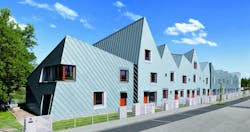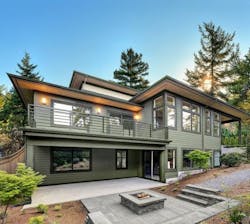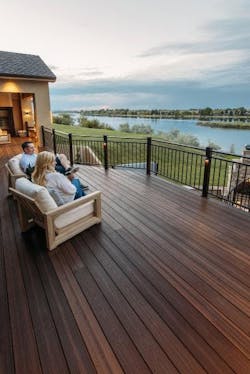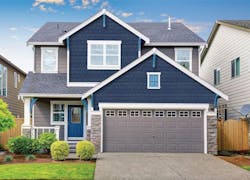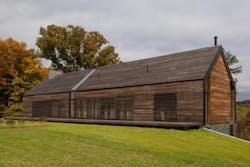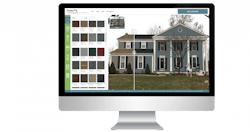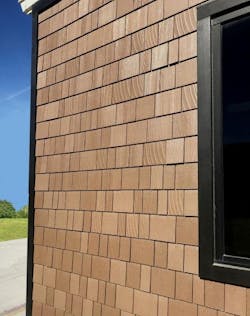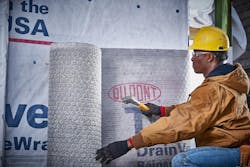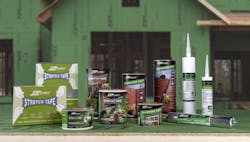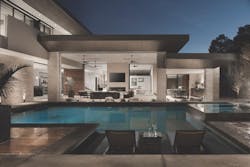Outer Limits: 27 Exterior Products to Improve Your Curb Appeal
The draw of fresh air, abundant light, and oxygen-giving greenery is stronger than ever, as the move toward outdoor living ramps up.
The American Society of Landscape Architects’ 2018 trends survey identifies the three most popular outdoor design elements among respondents as: fire pits/fireplaces (66 percent), lighting (65 percent), and seating/dining areas (64 percent). In addition, homeowners are looking for flexible spaces where they can do yoga or relax and charge their phones.
Mastic Western Extreme Siding withstands weather challenges while maintaining a beautiful aesthetic, the company says. Designed and engineered with advanced polymers, pigments, and additives, the material helps to reflect high levels of infrared energy and improve resistance to heat-related damage from the sun. Available in 20 colors.
The association updated this latest version of its survey to include new types of outdoor amenities that appeal to both single- and multifamily residents. “Because of this change in the survey, flexible outdoor spaces for such activities as yoga and outdoor movie nights as well as charging stations for mobile devices entered the top ten project types for the first time,” ASLA says.
When it comes to the garden, sustainability reigns. The top landscape and garden elements include native plants, low-maintenance landscapes, rain gardens, permeable paving, and drip irrigation.
“Enhanced railing systems, which include those with cable or glass, is a new answer choice added to the outdoor structure category this year,” the report says. It ranked first in this category, followed by pergolas and decks.
Envision composite decking features compression-molded construction that creates textured, deep-grain patterns. Grain and color patterns are random, and no two boards are the same. This eliminates the need for contractors to sort boards or pre-lay the deck, saving time and money.
Speaking of decks, there’s been a surprising shift in builders’ approach to them. According to Home Innovation Research Labs’ 2018 Annual Builder Practices Survey, more new homes are getting side and rear porches and decks than in past years, but fewer are getting on-grade patios.
“Patios, typically on-grade structures found at the side and rear entries of homes, were much more commonplace in the 2000s,” Home Innovation says, pointing out that 13 years ago, they were found on about 60 percent of all new single-family detached homes. Today, only about a third of new homes have patios. Taking their place, and continuing to grow in popularity, are outdoor decks and side or rear porches.
TandoShake Cape Cod Perfection features crisp, square edges and the look of painted wood. Offering a 5-inch exposure and a subtle wood texture, Cape Cod Perfection is easy to install and comes in a variety of solid colors, including Classic White, Ashwood Gray, Slate Gray, Wheat, and Mariner Blue (shown).
What’s puzzling is that—despite currently being outpaced in popularity by other outdoor living features—patios continue to have many advantages over competing outdoor elements. Patios are generally lower in cost; are typically easier to integrate with landscaping, fireplaces, and outdoor kitchens; and have more materials and fi nishes for builders to choose from, such as stone, brick, tile, concrete paving, and decorative concrete.
So, why is the higher-cost alternative gaining in the market? Home Innovation asks. “In addition to an improving economy that favors higher-end purchases, there are two other likely factors. First, patios are typically best suited for flat lots, which are becoming more scarce as high-quality buildable lots have fallen into short supply. Decks and porches are sometimes the best alternative for sloped lots. Second, because decks and porches are very often built with a walking surface at about the same level of the adjacent indoor living areas, they give the feeling of continuity between inside and outside living areas.”
Using a bio-based modification process that improves the properties of softwoods, the manufacturer’s treated siding, decking, and shiplap products are rendered stable and highly resistant to rot, checking, and warping. The modified wood was used for the siding and roof of this New York home.
Our cover story this month provides a snapshot of what’s trending in outdoor and exterior products, from modular appliances and new ceramic roofing to a new all-in-one exterior weatherization system that saves builders time and money, to decking that’s a dead ringer for wood. Take a look, there’s surely something for your next home.
Augmented Reality Makes Exterior Remodeling Easier
Using Chameleon Power’s Photo + Measure tool, contractors can take their projects to the next level.
The software allows both professionals and homeowners to visualize roofi ng, siding, and other exterior material options on a photo, rendering, or drawing of a real home project. It can also provide accurate measurements and price estimates for different materials, allowing contractors to generate quotes.
By enabling homeowners to visualize exterior designs before implementing them, Chameleon Power says the tool “shortens the design cycle and enhances customer satisfaction.” The company also claims that websites using Chameleon visualizers see user time on site triple and sales increase by up to 75 percent.
Contractors can work with Chameleon Power to build the Photo + Measure tool into their websites, or the tool can be accessed through photomeasure.net. If the tool is built into their site, contractors can load the visualizer with preferred product brands and finishes. The visualizer can be used on a desktop computer, as well as on most recent smartphones. Photo + Measure is one of several visualization technologies offered by Chameleon Power, including augmented and virtual reality tools and BuilderVision, a visualizer for home exteriors and interiors.—Amanda Hermans
JAMES HARDIE BUILDING PRODUCTS
The Artisan Shingle—the latest addition to the company’s Aspyre Collection—mimics the look of traditional cedar shingles while offering the durability of a fiber-cement composite material. Available primed or with the brand’s ColorPlus Technology in a two-toned look.
Tyvek DrainVent Rainscreen creates a 0.25-inch space for water drainage and air movement behind cladding. Offering protection against moisture damage in exterior wall systems, the product can be installed behind stucco, stone veneer, brick, wood, fiber cement, and metal panel systems. It helps prolong the life of exterior cladding, the company says.
HUBER ENGINEERED WOODS
The manufacturer of the Zip System has expanded its line of sealing solutions with six new flashing and stretch tapes. It now offers five Zip System stretch-tape options and fi ve Zip System flashing (straight) tapes that provide stronger performance in a broader range of temperatures, the company says.
Grezzo is the brand’s latest stone veneer profile. A contemporary stone with clear-cut lines, it offers a wide range of panel sizes, allowing builders, designers, and architects to explore design possibilities and develop unique patterns. Four colors are available: Principe, San Domino, Rosa (shown), and Sabbie Nere.
